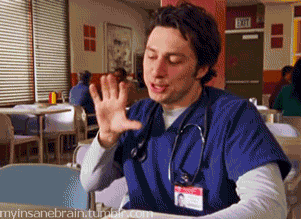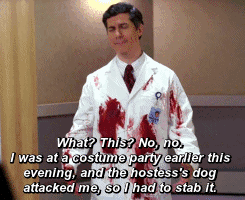Sometimes readers send in a broad or specific question they’d like witches’ experiences on. In today’s issue, a reader asked for some input on advocating for a child with a congenital condition in hospital settings as well as how to teach your child to advocate for themselves.
Here’s the question:
I had a rather emotional doctor visit with my 7 year old yesterday. He was born with microtia and atresia of his right ear. We’ve been to a myriad of doctors over the years - mostly ENTs - and I cannot recall one single encounter that didn’t leave me feeling emotionally wrung out. Yesterday’s appointment was the first time I noticed how these ‘first’ appointments with a new doctor affect my son. They look at him as an object they can’t wait to carve up, and I felt like he really understood this for the first time yesterday. It was TERRIBLE. We stood in the parking lot afterward and he cried and cried and said he didn’t want surgery. He woke up during the night from anxiety caused by doctors who couldn’t recognize the humanity of a small patient.
I know that I am not the only parent dealing with a child who has ongoing health issues and gets put into situations like this with doctors who can’t see past the chart. And I wonder how other witches handle advocating for your child while also teaching them to advocate for themselves. I can’t protect him from his condition and from the reality of the choices that are coming our way nor do I want to. But, I would love to hear from others how they handle these tough situations.
Below are some answers I got from my witch network (including a surgeon with pediatric experience.) Comments are open if you have further insight as a caregiver, child or physician in this scenario. Share the knowledge, and the empathy.
“I’ve experienced this a lot with my son and his behavioral issues when we are trying to establish care with a new psychologist/psychiatrist and I fully feel what this reader is saying with the exhaustion after these appointments. It’s really hard to run through the litany of a child’s problems when they are sitting right there. One upside of the COVID world is that I can now have private meetings with his psychiatrist online and just have him step in at the end for her to ask him a few questions. Depending on how old he is, could the child have the physical exam and then step out to the waiting room or another room with an iPad for the discussion part of the visit? That way you can strategize and discuss potential risks/recovery time without them having to hear all of the details.”
*
“I am a PeerWise volunteer at Lurie Children’s Hospital, a program where they pair been-there-done-that parents with parents of newly diagnosed children or parents struggling with their child’s medical condition. One thing that has really resonated with me in training is that elective/cosmetic surgery should be the decision of the child. If the child is too young or too indecisive to make the decision, wait it if is possible to get their input and opinion. Your adult child will be grateful you did so.”
*
“I do not have this experience as a parent, thank god, but I have had it myself as a patient. I’ll go to a dermatologist or a gynecologist, for example, and suddenly, I’m a teaching tool for their med student/intern about medical conditions entirely unrelated to that doctor’s specialty/reason for my appointment just because I am there, and the condition is visible. They proceed to talk about me as of I’m not there. It is so upsetting.”
*
[An MD witch]: “I am sure the child is already self-conscious about having a visible physical difference relative to other kids his age and I’m sure having it discussed and dissected in detail at an age when all you want is to be feel ‘normal’ is particularly humiliating. I know lots of really fantastic and lovely surgeons who are well-intentioned and technically gifted at what they do but are awkward communicators. In some ways, it is advantageous for the surgeon, while in the OR, to just focus on the one body part that they are operating on because if they are thinking about the whole person and the implications the surgery could have it becomes heavy and too much pressure and they could never do their job. But while the patient is in the consultation room they absolutely do need to think about the humanity of the patient and to consider the potential emotional impact of what they are saying. If the kid is present just long enough for the doc to take a look and the parent(s) and the surgeon can speak as frankly and openly as possible about risks and benefits, then the parent(s) have had time to process they can present the surgery in a validating and palatable way to the kid.
In Dialectical Behavior Therapy there is a tension between accepting where you are at while also acknowledging that things could be better, and I feel like that feels applicable in this case. The parents can communicate a similar message to the child (e.g. ‘You are absolutely lovely the way you are and we love you no matter what, but we do recognize that this is something that we have the option of changing if you want it. Let’s think together about what might be good about making the change and what might not be so great and talk about that’) and give the child room to express concerns or ask questions with a trusted adult if that feels missing from the situation with the doctor.”
*
“Mom of a kid with 12 surgeries on her resume here, confirming that surgeons very often have pretty terrible interpersonal skills and it sucks. One thing I do, in every medical encounter, is to look for a way to give my kid a sense of control early on. For example, she gets a lot of EKGs so we tell the tech, ‘She’s really good at putting the stickers on herself if you show her where.’ She also always takes stickers/adhesive things off by herself when it’s time; it seems to hurt less and is one less thing they are doing to her. If we’re doing a blood draw, we let her pick which arm. This helps her feel more in control in shitty situations and helps medical folks remember to see her as a full human, who is in charge of her own body.
In the long conversations about options, I’d give the kid a choice ahead of time: ‘Do you want to listen, or do you want to bring an iPad and headphones and not listen, but we’ll talk about everything afterward/before we make any decisions?’ Depending on the kid/age, it could be great to have them in the discussion, with you regularly giving them the chance to speak up, answer questions, own the experience. Or that may be too overwhelming and it’s better for you to debrief later in a way you know your kid can handle.
If this will be an ongoing relationship, try to stay open to evolving and building rapport. My daughter has had two surgeons who I thought were absolute dicks upon first meeting and now have great relationships with. In one case, I mistook as rudeness the fact that my baby was dying and he was rushing her into surgery and didn’t have time to be nice. Turned out to be a totally lovely guy and so sweet to my kid. In another case, the surgeon really is a big ego hotshot guy who, to be honest, doesn’t always see his patients as fully human. But after we worked with him for a few procedures, I realized that was a coping mechanism; he’s actually incredibly attached to these kids and has to put in some distance. We had some hard conversations during really rough times; we forced him to improve communication in some areas and he did, and he always delivered in terms of flawlessly executed medical care. He has since moved to a different hospital out of state and we are still send Christmas cards. (He’s also a younger guy who became a dad a few years into working with us and I think that REALLY helped make him more human with the families he works with.)
Also! We’ve invested in years of trauma therapy for my daughter, and the result is she is really confident and casual in talking about her condition and the way it manifests visibly (she has a ton of scars on her torso, and often has blue lips which other kids don’t really seem to notice but adults can get hyper about). It sounds like this child is experiencing his condition as something that happened to him; he doesn’t have a narrative about it that he owns. A good therapist can help loads with this.
Finally, whenever we see a new medical person, I make sure that the doctor introduces themselves directly to my child. Because they often rush in and say ‘Hi Mom, I’m Dr. So and So’ (or, like, not even) and I’ll say, ‘So nice to meet you! Please introduce yourself to my daughter, too.’ So then, right away, they have to engage with her as a human, not a chart. And always look for opportunities for your child to say no. Because there’s a lot they can’t say no to in a medical setting, but anything that IS optional, make sure to support them if they say no. A child life specialist taught me this when she brought all these toys into my kid’s hospital room and she refused to play with any of them. The specialist was like, ‘This is probably the only ‘no’ your daughter’s gotten to give all day; respecting that is more important than finger painting today!’ It’s been a sort of useful throughline for me, even if it’s just knowing that we’re going to come home from a medical appointment and have to respect a lot of ‘no’s for the rest of the day while she regains her sense of control.”
*
[MD witch:] “How you as a family feel ‘seen’ by your provider is paramount. Their skills are learned techniques that robots will do someday. Their humanity and compassion are unique and unfortunately are not a natural byproduct of an excellent education. So my advice to this mom, and anyone who is looking for medical answers to a complex congenital, traumatic or cancerous condition, is to search for a surgeon who you connect with and connects with you. That may sound like a luxury because not everyone has time to go to a bunch of appointments. I would start with searching online support groups for physician recommendations from actual patients. Online star ratings are not accurate. You can then reach out to the office. The physician’s nurse should be able to speak to you on the phone prior to your visit to discuss concerns and especially the way you feel your son and your family need to be approached. If you get a bad feeling from this interaction, move on.
In this case, there should also be a pediatric craniofacial team that includes a child life specialist or child psychologist whose focus is on working with kids and families with your specific difference. It might be beneficial to meet with this person first. This would help to gain entry into the group with an advocate whose sole purpose is to recognize your child’s humanity, fears and coping strategies.
Lastly, as a surgeon myself, I usually spend the first part of my visit meeting a new client, especially one with a complex problem, trying to decide if the best option is to not operate. That puts me in a position to really figure a patient out. What are the needs, the fears, what is the best approach (minimal or maximal?) what is the timing, (now or later or never?). There are clients that I’ve been seeing for years that I have never operated on because they aren’t ready. And we just see each other to check in. (This is typically children with pigmented birthmarks).
The surgery is the easy part. It’s 1-7 hours of quiet concentration. Everything before and everything after is the hard part. A surgeon who doesn’t appear to understand that is not worth your time working with.
Let your son do most or as much of the talking as he can. No matter how cold a surgeon may be, when they are forced to address a child or adolescent, they will be more apt to recognize the patient as a human being and hopefully come down to their level. Pause if the surgeon defers to you and let your child ask/answer first. You can sit on the examining table with him or sit in a chair next to him, but arrange your seating so that your son is always in the direct line of sight of the surgeon. Write down the questions in advance and practice having him ask you the questions. Rehearse the visit. You can even make it fun: pretend to be a grumpy surgeon or a confused surgeon or a farty surgeon or a surgeon who is secretly the President of the United States. It will give him more confidence and control in the room.”
End credits
I hope you enjoyed today’s issue of Evil Witches, a newsletter for people who happen to be mothers. This issue is free to all so go nuts forwarding if you have a friend who could use this issue. If you enjoy reading about the crossroads of motherhood and medicine, go deep and learn about colorectal consults (yes I did that on purpose), a tale of 3 hysterectomies, and more about talking to your child about their medical issues.
It would be super cool if you subscribed, though! Doing so supports this independent work and gets you access to subscriber-only content and threads.
If you have any questions, feedback, or suggestions for the newsletter you can reply right to this email. You can follow us on Instagram here and talk to other witches on Twitter, too. And I always appreciate a shout out social media, like so:









I have had some truly frustrating interactions with the ONLY pediatric orthopedic surgeon/doc in our immediate area/health network. At one point, when I was seeking to understand why my 18mo had contracted a 1-in-225,000 spinal infection, he said "who knows why anything happens, things happen because they happen" and I thought my head was going to come off. My best tactic is to say "if this was your kid, what would you want to know and how would you be considering the options?" It seems to get them out of auto-pilot because it makes it personal and puts them in our shoes.